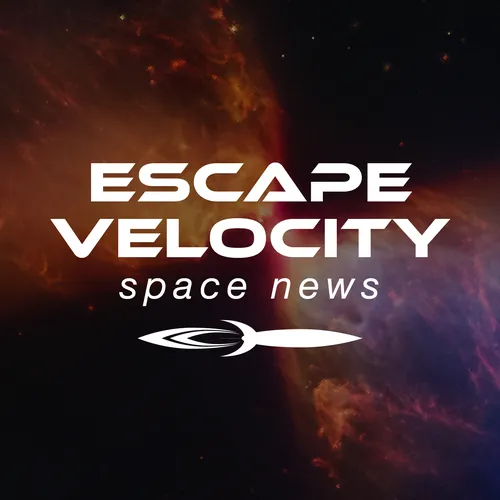
EVSN: Escape Velocity Space News
Get your weekly dose of all that's new in space and astronomy with Escape Velocity Space News. The sky is not the limit, as we bring you the latest scientific discoveries and rocket launches. EVSN is brought to you by the team behind CosmoQuest at the Planetary Science Institute and features hosts Dr. Pamela L. Gay and Erik Madaus, with audio engineering by Ally Pelphrey. EVSN is supported through Patreon at https://www.patreon.com/CosmoQuestX.
- Update frequency
- every 9 days
- Average duration
- 31 minutes
- Episodes
- 102
- Years Active
- 2022 - 2025

Whales and (Possible) Space Whales
As the Thanksgiving leftovers reach the stage of possibly gaining intelligence in the back of our refrigerators, we’re going to take a look at the origins of life, how we might find simple life on ic…

Blast From the Past: Watch the Annular Eclipse on October 14!
When we headed into recording this episode, I didn’t know if there would be a government shutdown or not, and I have to admit, on Saturday, September 30, I spent more than a few hours binge-watching …

Solar Cycle to the Maximum, 2025
Researchers currently think solar maximum - when the Sun is most active - will occur sometime in late 2024 to early 2025. With this cycle, we will experience just what a good blast of solar radiation…

Planetary Formation Leads to Strange New Worlds
We keep tweaking our format a little bit every episode, trying to find the right mix for YouTube, podcasts, and now, short-form video. We think we the setup is on the mark now and thank you for your …

It's Not Aliens (We Also Want Aliens)
There are some news cycles that are just plain weird, and this news cycle tried really, really hard to be one of them. Headlines last week highlighted that JWST observed methane and carbon dioxide in…

The Volcano That Could... But Didn't
Dr. Pamela is big on volcanoes, and she hoped we’d have an awesome new eruption to report, but we don't. There is, however, still a lot of news this week that doesn’t include an Iceland eruption. Ins…

More (Failed) Observations of Dark Matter
In this week's episode, we look at the upcoming solar maximum, how solar activity affects Neptune, the robotic invasion fleet on Mars, and how some of the weirdest star systems in reality have been a…

A River Runs Through It - Mars and Titan
This episode reminds you to look up, look out, and reflect on what we see around us. Stories cover a weird white dwarf that is doing things our Sun may do billions of years from now, how satellite im…

Satellite Constellations and Early Warning Systems
According to satellite cataloger Jonathan McDowell, there are now 18 satellite constellations, like Starlink, being planned. These constellations will contain 543,811 satellites. This is a whole lot …

The Universe is (Still) Trying to Murder Us
In today’s episode, we’re going to look at everything from how past Earth couldn’t support photosynthesis because the days were just too short, to current Earth letting us get hit by more Cosmic Rays…

Once and Future Life on Venus, Earth, and Mars
Each week, when we set off to do this show, we start with one core idea: We want to tell you what is new in space and astronomy… and remember Earth is a planet too. When we select stories, we try to …

Earth Science is Planetary Science
In this episode, we need to take one of our periodic looks at our planet's science and understand what it means to life as we know it. But we will only look at Earth for the first two segments. Then …

A New Space Race?
Space science isn’t where the money is… at least not yet. Astronomy and planetary science in the U.S. are funded by NASA, the National Science Foundation, and a variety of smaller foundations and ext…

The History of Life As We Know It
In this episode, we’re going to look at how we now work to understand the history of life - including human life - on Earth by studying the geology of our planet, and we’re going to take those lesson…

Meteors, Meteor Showers, and their Parent Bodies
In this episode, we’re going to be talking more about meteors - including the source of the Geminids meteor shower, asteroid Phaethon - as well as hot planets, hungry black holes, and how we’re worki…

SETI and the Very Large Array
While we could spend an entire episode on Earth, there is just too much going on in the universe to linger anywhere too long. From our world, we journey out to look at the super massive black hole in…

Do Not Look Directly at this Podcast
This episode features the kind of news week where we looked at the April 20th eclipse in the South Pacific and decided it just wasn’t a huge priority. Between watching Starship's “will it won’t it” l…

In Venus VERITAS
For decades now, our planetary science news cycles have been dominated by Mars. Mars is relatively close, and we have a lot of experience landing there and science goals to pursue. But it has left ou…

Pareidolia, Pattern Matching, and AI Art
Humans are the ultimate pattern matchers - at least for now. I have to admit I’m looking forward to the day I can give some new AI a set of images and ask it to tell me what animals it can find among…

The Search for Life on Other Worlds
Right now, humans are tantalizingly close to being able to search for life on other worlds where it is reasonable to think life could exist. We can’t do it yet - at least not in a way that would be s…